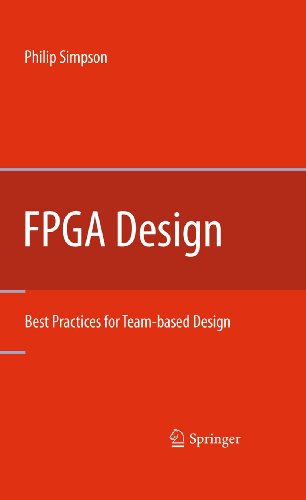Verwandte Artikel zu FPGA Design: Best Practices for Team-based Design

Inhaltsangabe
In August of 2006, an engineering VP from one of Altera’s customers approached Misha Burich, VP of Engineering at Altera, asking for help in reliably being able to predict the cost, schedule and quality of system designs reliant on FPGA designs. At this time, I was responsible for defining the design flow requirements for the Altera design software and was tasked with investigating this further. As I worked with the customer to understand what worked and what did not work reliably in their FPGA design process, I noted that this problem was not unique to this one customer. The characteristics of the problem are shared by many Corporations that implement designs in FPGAs. The Corporation has many design teams at different locations and the success of the FPGA projects vary between the teams. There is a wide range of design experience across the teams. There is no working process for sharing design blocks between engineering teams. As I analyzed the data that I had received from hundreds of customer visits in the past, I noticed that design reuse among engineering teams was a challenge. I also noticed that many of the design teams at the same Companies and even within the same design team used different design methodologies. Altera had recently solved this problem as part of its own FPGA design software and IP development process.
Die Inhaltsangabe kann sich auf eine andere Ausgabe dieses Titels beziehen.
Über die Autorin bzw. den Autor
Phil Simpson is Altera’s senior manager for software technical marketing and product planning. In this role, Simpson is responsible for Altera’s Quartus II software and third-party EDA interfaces product planning and the creation of the Altera design flow software roadmap. Prior to joining Altera in 1996, Simpson held several engineering roles at various EDA and semiconductor companies, including EDA Solutions, Data I/O and Lucas Aerospace. Simpson holds a BS (with honors) in Electrical & Electronic Engineering from City University, London and an MSC (with distinction) in system design from the University of Central England, Birmingham, England.
Von der hinteren Coverseite
FPGA Design: Best Practices for Team-based DesignPhilip SimpsonMany Companies struggle with establishing a working FPGA design methodology acrossdesign teams in their Company. As design teams become more dispersed globally, theneed increases for a standard design methodology. This book describes best practices forsuccessful FPGA design. It is the result of the author s meetings with hundreds ofcustomers on the challenges facing each of their FPGA design teams. By gaining anunderstanding into their design environments, processes, what works and what does notwork, key areas of concern in implementing system designs have been identified and arecommended design methodology to overcome these challenges has been developed.This book s content has a strong focus on design teams that are spread across sites. Thegoal being to increase the productivity of FPGA design teams by establishing a commonmethodology across design teams; enabling the exchange of design blocks across teams.Coverage includes the complete FPGA design flow, from the basics to advancedtechniques. Presents complete, field-tested methodology for FPGA design, focused on designreuse across design teams; Offers best practices for FPGA timing closure, in-system debug, and boarddesign; Details techniques to resolve common pitfalls in designing with FPGAs.
„Über diesen Titel“ kann sich auf eine andere Ausgabe dieses Titels beziehen.
- VerlagSpringer
- Erscheinungsdatum2014
- ISBN 10 148999789X
- ISBN 13 9781489997890
- EinbandTapa blanda
- SpracheEnglisch
- Anzahl der Seiten168
- Kontakt zum HerstellerNicht verfügbar
Neu kaufen
Diesen Artikel anzeigenGratis für den Versand innerhalb von/der Deutschland
Versandziele, Kosten & DauerSuchergebnisse für FPGA Design: Best Practices for Team-based Design
FPGA Design : Best Practices for Team-based Design
Anbieter: AHA-BUCH GmbH, Einbeck, Deutschland
Taschenbuch. Zustand: Neu. Druck auf Anfrage Neuware - Printed after ordering - In August of 2006, an engineering VP from one of Altera's customers approached Misha Burich, VP of Engineering at Altera, asking for help in reliably being able to predict the cost, schedule and quality of system designs reliant on FPGA designs. At this time, I was responsible for defining the design flow requirements for the Altera design software and was tasked with investigating this further. As I worked with the customer to understand what worked and what did not work reliably in their FPGA design process, I noted that this problem was not unique to this one customer. The characteristics of the problem are shared by many Corporations that implement designs in FPGAs. The Corporation has many design teams at different locations and the success of the FPGA projects vary between the teams. There is a wide range of design experience across the teams. There is no working process for sharing design blocks between engineering teams. As I analyzed the data that I had received from hundreds of customer visits in the past, I noticed that design reuse among engineering teams was a challenge. I also noticed that many of the design teams at the same Companies and even within the same design team used different design methodologies. Altera had recently solved this problem as part of its own FPGA design software and IP development process. Artikel-Nr. 9781489997890
Anzahl: 1 verfügbar
FPGA Design: Best Practices for Team-Based Design
Anbieter: Revaluation Books, Exeter, Vereinigtes Königreich
Paperback. Zustand: Brand New. 166 pages. 9.25x6.10x0.38 inches. In Stock. Artikel-Nr. zk148999789X
Anzahl: 1 verfügbar

